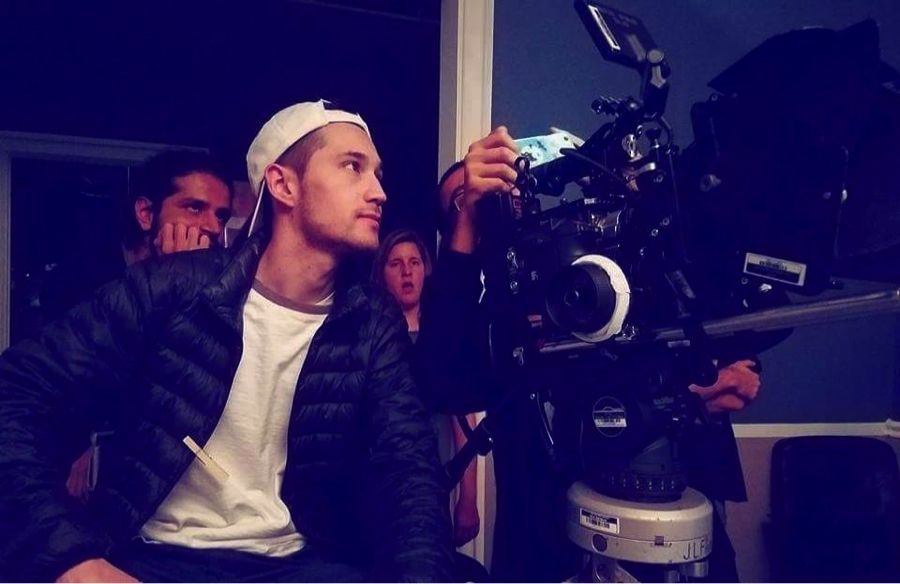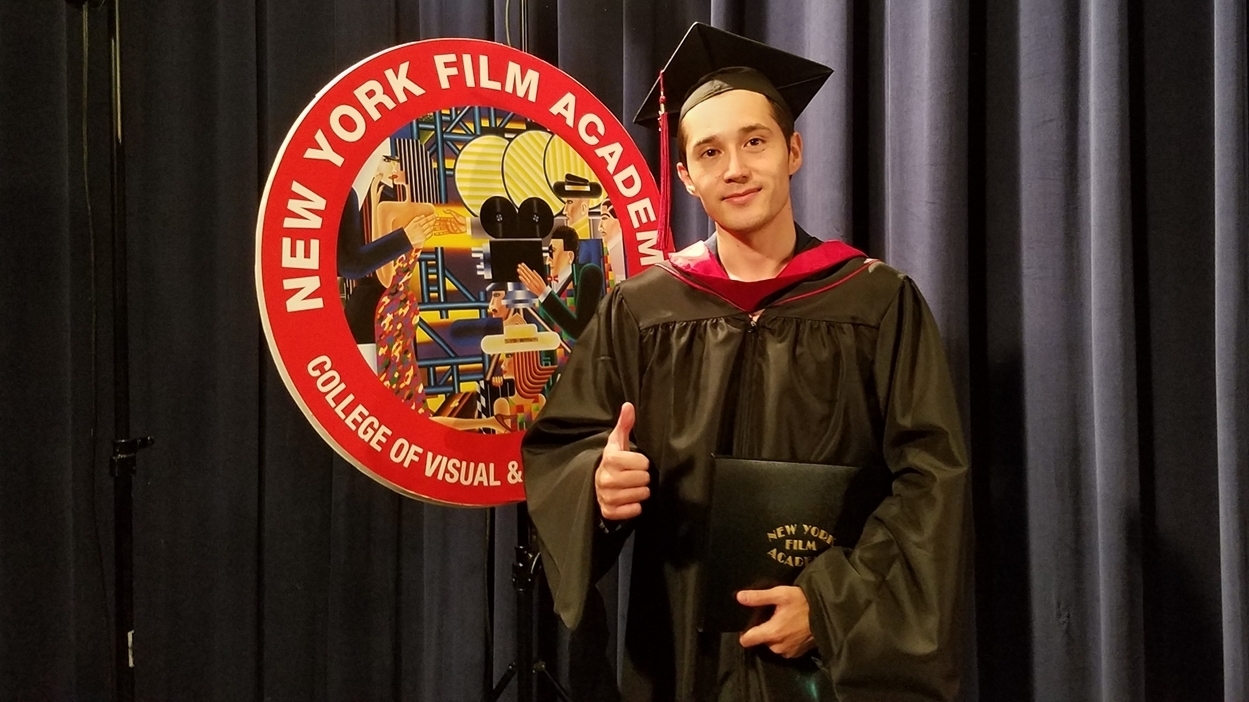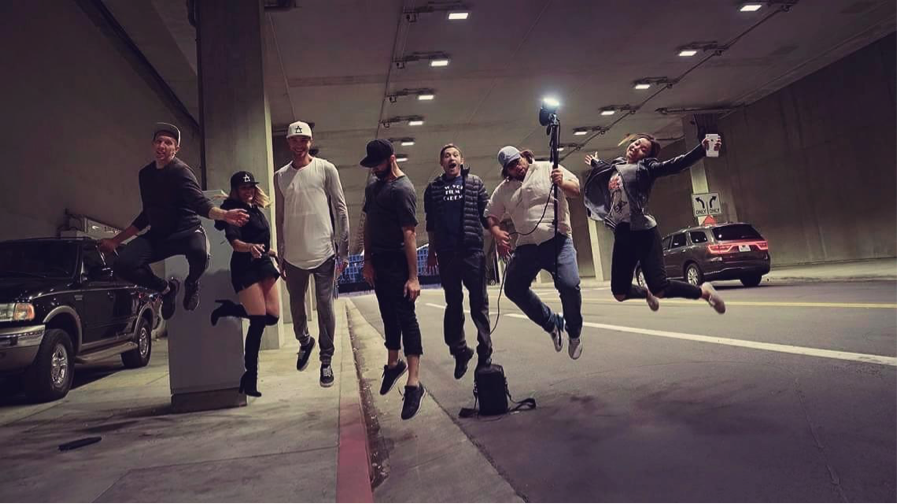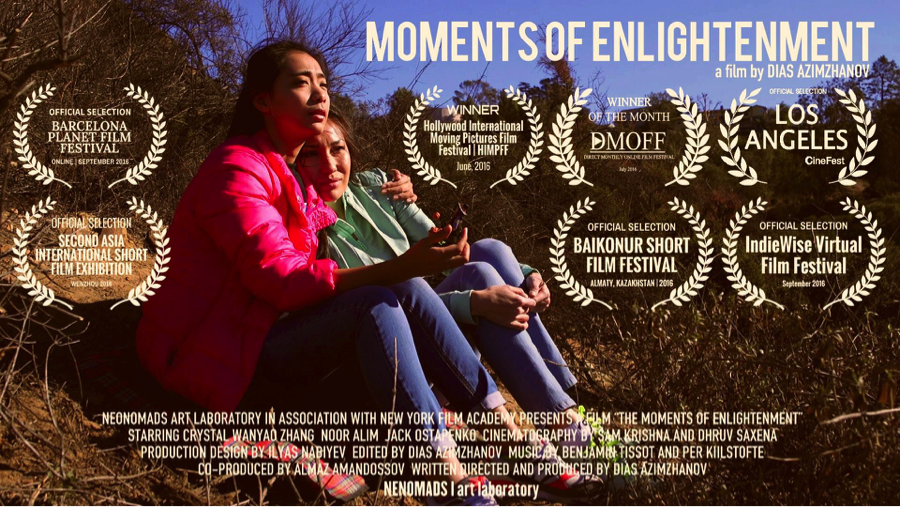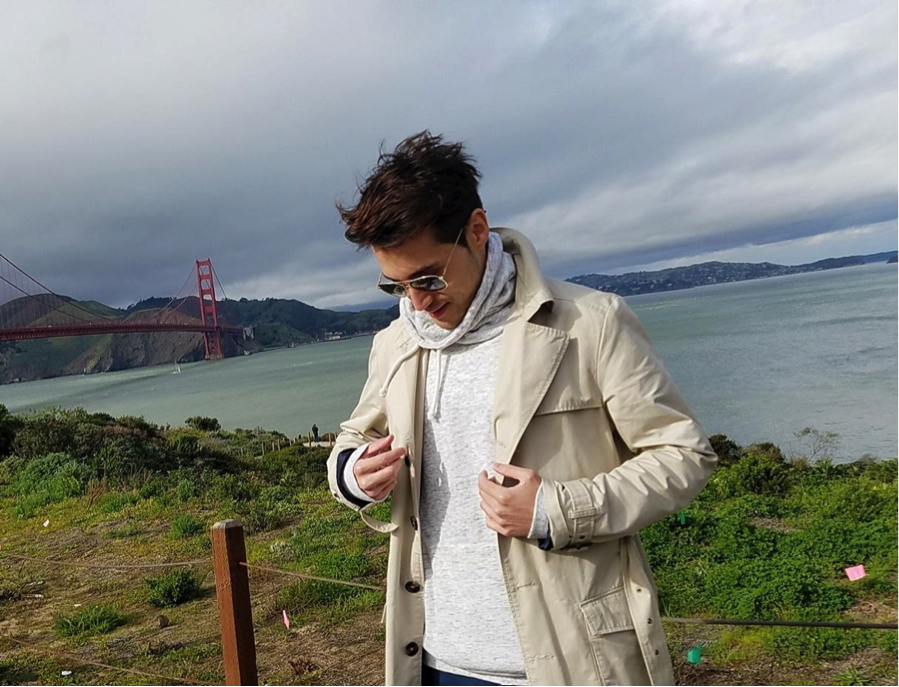New York Film Academy College of Visual & Performing Arts (NYFA) MFA Alumnus Dias Azimzhan was always interested in storytelling, starting out as a blogger before deciding to pursue filmmaking. Azimzhan’s transition to a new profession wasn’t seamless and he had to spend some time working for an international airline company before attending NYFA.
Eventually, with help of the Kazakh Bolashak Scholarship program, Azimzhan was provided the opportunity to attend NYFA, and recently graduated completing the education he dreamed about. His first film, “Moments of Enlightenment,” screened at numerous festivals, taking home awards from the Hollywood International Moving Pictures Film Festival.
NYFA sat down with Azimzhan to find out more details of his journey.
NYFA: Based on your experience, what do you recommend to those who are just planning to apply for the Bolashak scholarship program?
DA: At the beginning of the process, you may be scared and demotivated by the list of documents that you need to collect, but this procedure is also similar in other countries (including the U.S.) when applying for certain grants, so I advise you to be patient.
Look at this process as the first step of the journey to your dream. Further, during following stages, be self-disciplined and organized as possible. Plan and rationally use your time for preparing other documents and visas. It is important do not be late for the beginning of the academic year. Start dates can vary depending on the school and country.
NYFA: What was most difficult during the Bolashak application process?
DA: During the examinations, I often heard from the candidates for the scholarship that the third stage is the most difficult, that is, the last stage of the selection. In this round, the candidate surrounded by members of the selection committee (usually composed of the President of the Center of International Programs, doctors of science, professors and public figures) answers various questions. Those questions can be absolutely unpredictable — they can ask you about the constitution of the country, continuing with questions in poetry, mathematics, history, psychology, foreign languages, etc.
However, personally, for me, the most difficult stage was the second one, where the candidates who passed the first round have to take an IQ and psychological test. Additionally to logic tasks, it includes various mathematical and geometric questions. About 500 questions in total.
It’s also important to mention that each Bolashak scholarship candidate has to know Kazakh language on a very high level. Everyone will have to pass KAZTEST in the first round (analog to TOEFL and IELTS), and based on results you will either go to a second round or not.
NYFA Why did you choose the New York Film Academy College of Visual & Performing Arts?
DA: It all started in 2011 when I decided to write a script. At that time I had a blog (where I was writing my thoughts and observations) and I thought that it would not be difficult for me to write a story for the movie. I installed “Finaldraft” (screenwriting software) and started. But on the first paragraph, it became clear that I did not have enough knowledge in this area. I did not know how to structure and tell the story for the screen using pen and paper. The art of screenwriting has its own nuances (for example, you can not write the characters’ thoughts as in novels, as the viewer simply does not see it). I began to look for materials and educational institutions to fill the gap.
I primarily considered the New York Film Academy because of the intensive program, with an emphasis on practice. Also, NYFA instructors are working in the film and television industry, which is important in terms of gaining new knowledge from them.
Unfortunately, at that time I did not know about Bolashak, and did not have the necessary financial funds to apply. I had to postpone my dream. And, as it turned out, everything does happen for reason: While creating a financial basis for the future, I was working in the international airline company. I saw the world and got acquainted with the culture of many countries, which helped to significantly improve and broaden my horizons and critical thinking. Those qualities are very important for the director and filmmakers in general.
Eventually, already with little life experience and certain skills, I decided to return to the realization of my dream and plunge into the creative process, which imbued the walls of NYFA.
NYFA: What is your impression of your NYFA program? Do you have a favorite subject or instructor?
DA: I was enrolled in NYFA’s MFA (Master of Fine Arts) in Filmmaking, where the main emphasis is on directing, screenwriting and cinematography. You also learn producing, acting and other components of film art in general. Since this is a degree program, in the first year of study we simply do not have time for anything else besides school. The world of cinema becomes a part of your life (if not all life), whether you like it or not.
I would like to highlight screenwriting instructor, Lee Gordon. In his class, I gained knowledge on structuring story and the ability to apply this knowledge directly to the shooting process. Also, a thank you goes out to directing instructors Steve Morris and Michael Sandoval, for teaching me working with actors and listening and feeling every member of the crew. All these years, Carl Bartels taught us the art of cinematography. In his classes, we learned different cameras, lenses, compositions and how to feel the visual components of the frame. I also want to highlight Mark Horowitz, who shared his huge experience in the film business and content promotion.
NYFA: Your short social drama “Moments of Enlightenment” has won many awards at various film festivals. Tell us how the idea for this film was born?
DA: In 2008, one of my friends lost her job. It was during the global financial crisis. By the way, I also lost my job then. I think almost everyone remembers this difficult period for many in the world. On one cloudy autumn day, I met her at the cafe, and she told me about her difficult situation, including problems in the family. I was helping her as much as I can. Part of her story remained in my head forever.
And when I had an opportunity to tell the world a small story, I decided to share that period of my acquaintance’s life (with her permission), through the prism of two immigrants living in the U.S.
NYFA: Recently, you starred in Alisher Suleimen’s “Cloud on the Roof.” Did you use behind-the-scenes experience and knowledge in acting?
DA: I think behind-the-scenes experience gives a huge advantage to the actor, not only in knowing the geography of the scene and the shooting process but also in understanding the story itself since not every actor can think like a director. But neither does every director think like an actor in terms of becoming a new character; finding and making new skills, habits, weaknesses and strengths his own.
I had the opportunity to synchronize my knowledge in both, because I already had acting experience in small projects, as well as experience in studying the art of improvisation at NYFA along with the courses I had taken in Almaty, Kazakhstan.
NYFA: What did you learn from acting as a director?
DA: Nowadays, due to lack of time and the fast pace of pre-production, not every director, unfortunately, has the opportunity for deep and detailed exploration of characters, giving preference to breaking down the story itself — which is also very important. Actors can fill that gap and breathe life into the characters, but they need to do it together with the director and screenwriter; otherwise, free interpretation can have a negative impact on the story and even ruin the project.
NYFA: What projects are you currently working on?
DA: Now is the editing process of the recently shot short “Interius: The War Within.” I think we will finish the post-production of the film by fall.
Also, we shot three music videos with Kazakh singers. One of them has already been aired on the national music channel. All of them were shot in Los Angeles, and I was responsible for the script and directing of storyline.
In parallel with the editing, I am writing a script for a feature film under the working title “Pure Society.” I write in English, but depending on where it will be shot script can be translated and adapted.
WATCH “Ulitio” Official Trailer :
NYFA: Where do you see yourself 10 years from now?
DA: I see myself the founder of production studios and a film school. Perhaps, the director-inspirer of the younger generation, who still has to keep building our society together with you, a society of people with an unconventional thinking and a fair approach to life.
New York Film Academy would like to thank Dias Azimzhan for sharing with us his story. We believe that his experience is truly inspiring and would like to wish him all the best with his filmmaking career.

